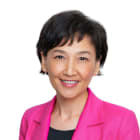Commentary: Retaining nurses in Singapore’s public healthcare is about more than just monetary incentives
To ensure Singapore’s healthcare system stays resilient and delivers excellent patient care, it must invest in the backbone of the system, say nursing leaders Liaw Sok Ying and Zhou Wentao from the Alice Lee Centre for Nursing Studies at the National University of Singapore.

A nurse with an elderly patient. (File photo: iStock/Kiwis)

This audio is generated by an AI tool.
SINGAPORE: Nursing has always been an undervalued and tough job, even without a global health crisis. The recent pandemic proved just how crucial nurses are and how vulnerable they have been.
A year after Singapore moved to an endemic COVID-19 norm, the announcement of a new retention scheme for nurses is an encouraging step in the right direction that demonstrates the government’s commitment to retaining nurses.
On Feb 20, Minister for Health Ong Ye Kung announced that nurses will receive up to S$100,000 in incentives to stay in the public healthcare system, with payouts every four to six years over 20 years or up to the prevailing retirement age. This will benefit about 29,000 nurses in the public system.
This comes at an important time. The pandemic intensified a worldwide demand for nurses – every country is grappling with a shortage of nursing manpower, resulting in job opportunities across the globe.
Nurses form the single largest group of healthcare professionals, with a presence across all care settings. However, burnout and job dissatisfaction have contributed to nurses leaving the profession in search of alternative career paths – and this has significant implications for patient care.
While retaining nurses is crucial, recognising and recruiting them are equally vital in ensuring our healthcare system stays resilient and sustains excellence in patient care.
RETAIN - SUPPORTIVE WORK ENVIRONMENT, DIVERSE CAREER TRACKS
Retaining nurses must be more than just about monetary incentives. Money doesn’t solve burnout or unsupportive work environments, and incentives are also often offered overseas to attract those willing to migrate.
To retain nurses, healthcare organisations must prioritise the creation of supportive work environments that value their contributions and prioritise their well-being. From long hours and heavy workloads, to complex interprofessional relationships and the mental burden of bearing witness to illness and death, the demands placed on nurses can be a lot to bear.
Boosting mental fitness is thus vital. No one should assume that nurses can take care of themselves simply because their work revolves around taking care of others.
Besides the usual counselling and self-care strategies, it is essential to foster a supportive work environment where nurses feel comfortable discussing their problems and mental health issues and seeking support. Providing trained support from psychologists and psychiatrists could also pave the way to help nurses grow in their emotional well-being.
Opportunities for professional development and career advancement are also important. Career trajectories can go down distinctive paths such as education, clinical, management, informatics, innovation and research. These opportunities enable nurses to stay clinically relevant and adapt to evolving healthcare practices and technologies.
Postgraduate programmes that are specifically designed to advance nursing practice can nurture Advanced Practice Nurses (APN), nurse clinician scientists and other leadership roles.
One noteworthy aspect of the APN role is in collaborative prescribing. MOH's ambition to have up to 700 APNs by 2030, who can prescribe medication – a task traditionally only carried out by doctors – marks a paradigm shift. It recognises the expertise of APNs in medication management and enhances their autonomy in delivering comprehensive healthcare.
RECOGNISE - MORE THAN HYGIENE CARE
Despite the increasing recognition of nursing as an important and noble profession since the pandemic, nurses remain underappreciated.
Nurses’ work goes far beyond the hygiene care tasks generally perceived as their main duties. While delivering bedside care, nurses need to be equipped with the sound clinical knowledge and reasoning that is crucial in saving lives.
Nurses are often the first to pick up early abnormalities and behaviour changes in patients, and alert doctors based on their clinical reasoning skills. Subtle changes like increased restlessness or dips in blood pressure or other vital signs could be tell-tale signs of worsening condition or unexpected adverse effects. Picking up on these changes kickstarts the process of further investigations and treatment, potentially saving the patient’s life.
The healthcare community is increasingly recognising nursing as one of the key drivers to solve the nation’s healthcare issues. The collaborative role of nurses with other healthcare professionals to provide team-based interprofessional care is essential to support the delivery of quality population health across the continuum of care.
Students of NUS Nursing have the opportunity to learn alongside students from Dentistry, Medicine and Pharmacy through the Common Curriculum for Health Professional Education. The interdisciplinary approach promotes an understanding of social issues, teamwork, communication, ethics, professionalism, digital literacy and interprofessional education in health and healthcare.
RECRUIT - OPPORTUNITIES FOR HIGHER EDUCATION
Apart from relying on foreign-educated nurses, investing in growing and expanding the domestic nursing workforce is crucial to ensure self-sufficiency.
At present, there are four levels of nursing academic programmes in Singapore, at the certificate, diploma, degree and graduate level. Nanyang Polytechnic and Ngee Ann Polytechnic produce the bulk of the local nursing workforce, taking in about 1,400 nursing students a year.
There is evidence supporting the importance of higher education in nursing for better patient advocacy and outcomes. A large multi-site study in Europe found that every 10 per cent increase in nurses with bachelor’s degree was associated with a 7 per cent decline in patient deaths within 30 days of admission.
Listen:
Nurses with higher levels of education possess the knowledge and confidence necessary to inquire, make clinical judgments, and navigate the increasingly complex and dynamic healthcare environment. This proficiency enables them to collaborate effectively with other stakeholders to co-design patient care, ensuring that it is patient-centred and yields positive outcomes.
We must also recognise the pivotal role of education in recruiting and retaining the new generation of nurses, equipping them with a sense of purpose to uphold as a nurse. And as long we require foreign nurses to supplement the local nursing workforce and meet growing healthcare demand, there is a need to focus on transitioning education and professional development programmes to ensure patients’ safety and the well-being of the foreign nurses too.
Nursing is undoubtedly a noble profession, and it is essential to recognise that it entails more than a calling to serve with passion.
Investing in nurses and prioritising their well-being is crucial for ensuring their continued dedication and resilience. By providing support in various ways, we can empower nurses to thrive in their roles and deliver high-quality care to patients.
Professor Liaw Sok Ying is Head of Department, and Associate Professor Zhou Wentao is Director of Education, Post-Graduate and Continuing Education and Training, at the Alice Lee Centre for Nursing Studies, NUS Yong Loo Lin School of Medicine.




















